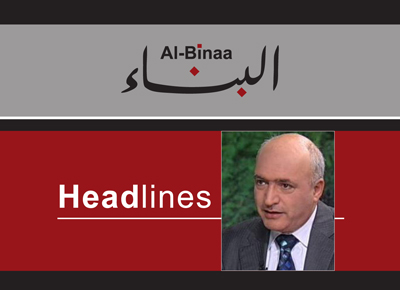Turkish Occupation Expands into Hama Under the Guise of “Nusra” … Reports of Counterattacks / Lavrov, Fidan, and Araghchi to Meet in Doha, While Arab Foreign Ministers Convene in Cairo
Qassem: The Agreement Is Geographically Limited to South of the Litani, and We Stand by Syria as We Always Have

December 06, 2024
The political editor wrote
Turkey has mobilised its forces, intelligence, and affiliated militias to fill the void left by the redeployment of all Nusra Front factions to the Hama front. For the fifth consecutive day, attempts to storm Hama have failed. Statements from Turkish President Recep Erdogan and the Ministry of Defense confirm Turkey’s close monitoring of military movements in northern Syria, further revealing Turkey’s overt responsibility for the occupation of the region. This escalation comes on the eve of the anticipated meeting of the Astana process nations in Doha, where Russian Foreign Minister Sergey Lavrov, Iranian Deputy Foreign Minister Abbas Araghchi, and Turkish Foreign Minister Hakan Fidan will convene.
Turkey’s calculations appear to hinge on maintaining influence without severing ties with Russia and Iran or jeopardising the Astana framework. Ankara aims to preserve the Astana process under its terms, while balancing its NATO alliance and strategic relations with Washington and Tel Aviv. Thus, today’s ministerial meeting is pivotal in determining the future of the Astana process and Turkey’s relationships with Russia and Iran. Speculation suggests Turkey might propose expanding de-escalation zones or negotiate a withdrawal from Aleppo in exchange for retaining Hama. Meanwhile, unconfirmed reports from sources such as Al-Mayadeen claim that the Syrian Army launched counterattacks, reclaiming strategic sites including Hama Military Airport, Jabal Zayn al-Abidin, and the headquarters of Brigade 87.
Simultaneously, the Doha meeting sparks speculation over Qatar’s potential inclusion in the Astana process, as hinted by Iran’s Foreign Minister. Arab and Israeli circles are closely monitoring developments in Syria, with Tel Aviv focusing on severing supply routes to Hezbollah – a promise Erdogan has reportedly made in exchange for securing a future mandate in Syria following the U.S. withdrawal. This would preemptively deny Russia a leadership role in managing Syria’s security and political affairs.
In Cairo, Arab foreign ministers are holding an extraordinary session amid a climate of solidarity with Syria, reflected in individual statements by concerned Arab states. However, questions remain as to whether Syria will receive tangible support beyond declarations – such as suspending adherence to U.S. sanctions that are crippling the Syrian state and society – or whether a strong message will be sent to Turkey, linking improved Arab-Turkish relations to curbing Ankara’s sponsorship of terrorist groups.
In Lebanon, Hezbollah’s Secretary-General Sheikh Naim Qassem addressed issues of shelter, reconstruction, and displacement, highlighting two key political points. First, he rejected any tampering with the substance of the ceasefire agreement, which he described as an implementation mechanism for part of UN Resolution 1701 that exclusively pertains to the area south of the Litani River. He emphasised that the future of the resistance’s weapons falls outside the committee’s mandate and is tied to the complete liberation of occupied territories, internal Lebanese dialogue, and the relationship between the resistance, the state, and the army.
Second, Sheikh Qassem discussed developments in Syria, describing them as part of a U.S.-Israeli project aimed at compensating for defeats in Gaza and Lebanon by targeting Syria, a vital stronghold of the Axis of Resistance. He affirmed Hezbollah’s unwavering commitment to defending Syria and standing by it, as it always has.




